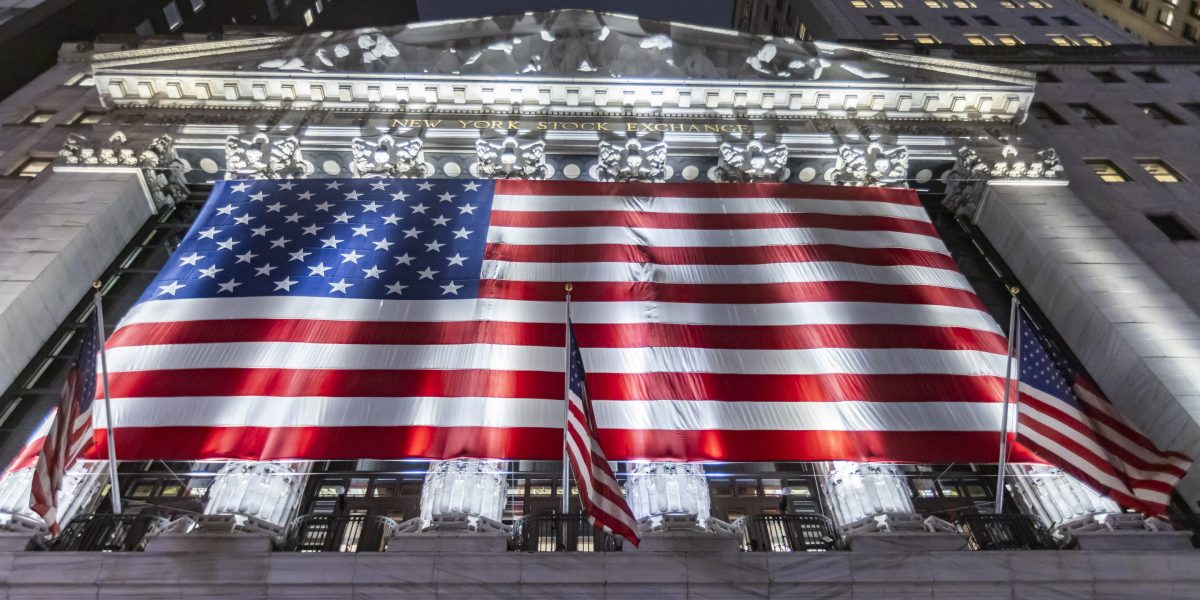- President Donald Trump’s aggressive tariff campaign is creating doubts about the attractiveness and safety of US assets. But there are still some who believe the US will produce the best returns, despite an epic selloff and signs of a shifting world order. That’s due in part to America’s dominance in critical technologies.
The idea of “American exceptionalism” in the global economy and financial markets has rapidly lost favor this year as President Donald Trump embarks on an aggressive tariff campaign that is creating doubts about US assets.
Stocks have suffered an epic meltdown and only partially recouped their losses. The dollar and Treasury bonds are losing their safe haven status. The economy may slip into a recession, soaring debt may start to overwhelm the “exorbitant privilege” the US enjoys, and the world was already having trust issues with America.
In contrast, markets in China and Europe have been relative outperformers this year after years of lagging behind the US.
But there are still some market veterans who believe the US is the place to be, due in part to America’s dominance in critical innovations.
‘Tech Trumps Tariffs’
Nouriel Roubini, an economist and CEO of the consultancy Roubini Macro Associates, believes “tech trumps tariffs” in the short run and the medium term.
The US boasts leadership in key technologies and industries, so it doesn’t matter who the president is, he wrote in a post on X on Thursday. Meanwhile, China comes in a “close second,” and Europe is out of the picture completely.
Roubini estimates that tech innovations will increase US potential growth by 200 basis points from 2% to 4% by 2030, while tariffs would drag down growth by 50 basis points, even assuming a permanent average rate of 15% after negotiations.
“So Tech Trumps Tariffs even if Mickey Mouse or a clown were to run the US! It doesn’t matter and American exceptionalism will remain and be resilient regardless of Trump given the hyper dynamism and innovations of the US private sector,” he added.
A critical part of Roubini’s thesis is that the nature of innovation itself is shifting from producing an “initial growth spurt that fizzles out over time” to exponential growth that accelerates and gives first-movers enduring advantages versus followers.
He pointed to DeepSeek’s AI model that shocked Silicon Valley earlier this year, saying it’s not a revolution but an evolution that owes its existence to US companies like OpenAI and their years of massive investments.
“MAG-7, hyperscalers and tech firms (in Nasdaq) could not care less about tariffs,” he added. “They gotta continue and increase massive Ai capex to avoid becoming obsolete relative to each other.”
‘Stay Home’
Meanwhile, Ed Yardeni has said that if Trump’s tariffs cause a recession, the US will suffer less than international markets and economies would.
“While some allocation to key international markets might be warranted over a long-term time horizon, we are sticking with our Stay Home investment bias,” he wrote in a note early Wednesday.
That came before Trump put a 90-day pause on his “reciprocal tariffs” on Wednesday afternoon and Friday night’s exemptions on tech imports. But Trump also warned Sunday that tariffs will eventually hit the “whole electronic supply chain.”
Still, the US enjoys full employment, is a net energy exporter, and has a flexible services-driven economy, with productivity growth that’s strong enough to outweigh pressures from supply-chain realignment and less immigration, Yardeni explained.
On the other side, China’s export-driven growth strategy may not work without US demand, while Germany’s manufacturers are being crushed by China, he added.
‘The US has a lot positive going for it’
Then there’s Mark Delaney, chief investment officer at AustralianSuper, which manages $223 billion of assets.
He told the Financial Times on Tuesday that the US is still the most attractive region for long-term investments, even as he acknowledged that Trump’s tariffs were a “significant volatility event.”
In fact, he hasn’t reduced his fund’s US exposure in recent weeks, and it remains more than half of AustralianSuper’s international holdings.
“The US has a lot positive going for it—strong economic performance (though it’s given a bit back), strong productivity growth, strong profit growth and, by any measure, many of the best companies in the world—all that makes it an attractive place to store capital,” Delaney told the FT.
Even though global trade flows could be upended by tariffs, the companies he’s investing in will likely be affected less.
That’s because tariffs are targeting goods instead of services—for now—though any escalation in the trade war may eventually hit those too.
“Look at any investor’s major holdings,” Delaney said. “There aren’t that many goods, it’s mostly services, that’s the way the global economy has evolved.”
This story was originally featured on Fortune.com
Source link

 Politics8 years ago
Politics8 years ago
 Entertainment8 years ago
Entertainment8 years ago
 Entertainment8 years ago
Entertainment8 years ago
 Entertainment8 years ago
Entertainment8 years ago
 Tech8 years ago
Tech8 years ago
 Tech8 years ago
Tech8 years ago
 Tech8 years ago
Tech8 years ago
 Tech8 years ago
Tech8 years ago







